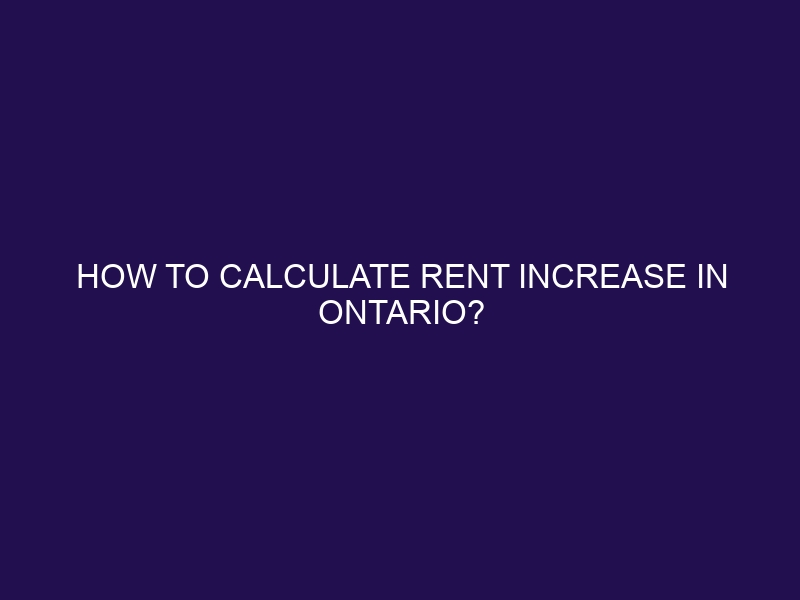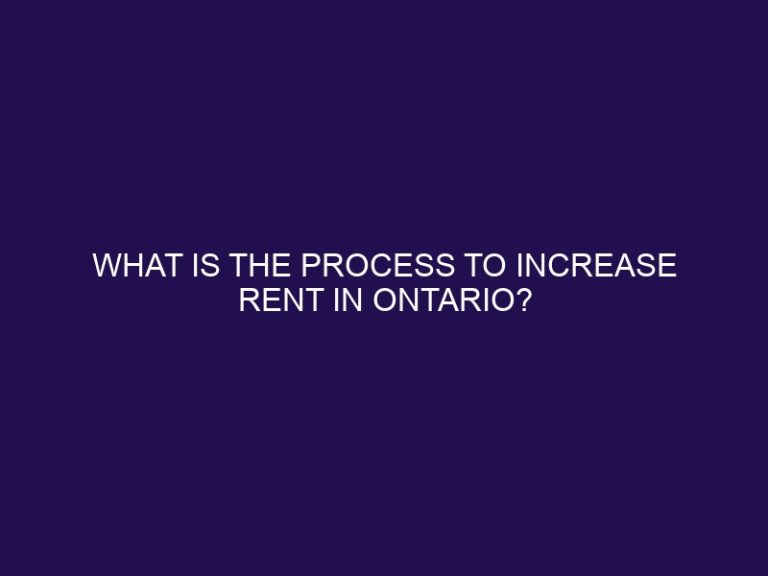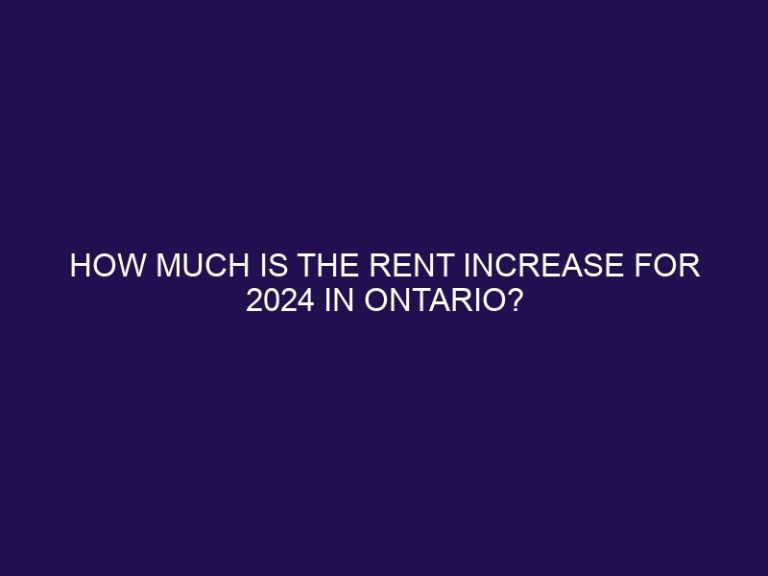How to calculate rent increase in Ontario?
.jpg)
Understanding rent increase in Ontario is essential for both landlords and tenants to navigate the rental market. Ontario has specific rules and regulations in place to ensure a fair and balanced approach to rent increases.
To begin, it is important to be aware of the rules and regulations for rent increase in Ontario. These guidelines outline the maximum percentage by which a landlord can increase the rent annually. there are exceptions to these guidelines based on certain circumstances.
When it comes to calculating rent increase in Ontario, there are specific methods to follow. The first method is using the annual rent increase guideline provided by the government. This guideline sets the maximum percentage by which a landlord can increase the rent in a given year. The second method involves calculating a rent increase above the guideline, considering factors such as maintenance and repair costs, property taxes, and utilities.
Landlords must consider various factors before increasing the rent, such as the costs associated with maintaining and repairing the property, property taxes, and utilities and operating expenses.
It is important for landlords to properly notify tenants about rent increase in Ontario and adhere to the proper procedure as outlined by the Residential Tenancies Act. Tenants, on the other hand, have rights and protections when it comes to rent increase, including the right to request a review of the rent increase and the right to challenge an above-guideline rent increase.
In some cases, negotiation between landlords and tenants regarding rent increase may be necessary. Open and transparent communication is key in these situations to ensure a fair and mutually beneficial agreement.
By understanding the rules, regulations, and procedures surrounding rent increase in Ontario, both landlords and tenants can navigate the rental market with confidence and fairness.
Key takeaways:
- Understanding the rules: Familiarize yourself with the regulations for rent increase in Ontario to ensure compliance and avoid potential legal issues.
- Calculating rent increase: To calculate the rent increase, landlords typically use the annual rent increase guideline provided by the government or calculate it above the guideline based on specific factors.
- Tenant rights and protections: Tenants have the right to request a review of the rent increase and challenge an above-guideline increase if they believe it to be unfair or unreasonable.
Understanding Rent Increase in Ontario
In Ontario, understanding rent increase is crucial for both landlords and tenants. As per the guidelines set by the province, landlords can only raise the rent once every 12 months and they are required to provide a written notice at least 90 days in advance. It is important for tenants to be aware that the maximum allowable increase for residential tenants in 2022 is 1.2%. However, it is worth noting that certain properties, such as social housing units or new buildings, may be exempt from these guidelines. To navigate through the regulations regarding rent increase, tenants should refer to the Residential Tenancies Act and seek advice from the Landlord and Tenant Board.
What Are the Rules and Regulations for Rent Increase in Ontario?
Looking to calculate rent increase in Ontario? Get ready to dive into the rules and regulations governing this area. We’ll start by exploring the annual rent increase guideline, and then we’ll venture into the exceptions that may apply. Buckle up as we navigate through the facts, figures, and events surrounding rent increases in Ontario, backed by reliable sources. Stay tuned for valuable insights!
Annual Rent Increase Guideline
The Annual Rent Increase Guideline is a regulation in Ontario that governs how much landlords can increase rent each year. It is based on the Consumer Price Index, a measure of inflation. The guideline for 2023 is set at 2.2%. There are exceptions to this rule, such as if the unit was recently constructed or if the landlord has incurred significant expenses. Landlords should consider factors like maintenance and repair costs, property taxes, utilities, and their financial needs when deciding to increase rent. It is important for landlords to notify tenants in writing about rent increases and for tenants to be aware of their rights, including the right to request a review or challenge an above-guideline increase.
Exceptions to Annual Rent Increase Guideline
In Ontario, there are specific circumstances and conditions that can lead to exceptions to the Annual Rent Increase Guideline. Landlords may be given permission to increase rent beyond the guideline in certain situations. These exceptions include:
| 1. Capital Expenditures: | If landlords have made significant capital investments in the property, such as major renovations or repairs, they can apply for an above-guideline rent increase. |
| 2. Utilities Costs: | In case there has been a substantial increase in the cost of utilities, landlords can request an above-guideline increase to cover these expenses. |
| 3. Property Taxes: | A significant rise in property taxes can be a reason for landlords to apply for a rent increase above the guideline. |
| 4. Extraordinary Operating Costs: | If landlords have faced extraordinary costs related to the operation and maintenance of the property, they can seek an above-guideline increase. |
It is important to note that landlords must adhere to the proper procedures and receive approval from the Landlord and Tenant Board before implementing an above-guideline rent increase.
How to Calculate Rent Increase in Ontario?
Want to know how to calculate rent increase in Ontario? In this section, we’ll uncover the ins and outs of this process. From utilizing the Annual Rent Increase Guideline to calculating rent increase above the guideline, we’ve got you covered with tips and tricks to navigate through the complexities of rent adjustments. Stay tuned for valuable insights and practical advice on managing rent increases in Ontario.
Using the Annual Rent Increase Guideline
- To calculate rent increases in Ontario, you can use the Annual Rent Increase Guideline. Follow these steps:
- First, check the current annual rent increase guideline set by the government.
- Next, verify if your rental unit is covered under this guideline. Certain rentals, such as new buildings or those with rent controls, may be exempt.
- If your rental unit is eligible, you need to calculate the maximum percentage allowed for rent increase. For example, if the guideline is 2%, you cannot increase the rent by more than this amount.
- Determine the current rent amount and multiply it by the guideline percentage. This will give you the maximum amount by which you can increase the rent.
- Finally, notify your tenant in writing about the rent increase, stating the new rental amount and the effective date.
- Remember to follow the legal requirements and provide proper notice to your tenants when using the Annual Rent Increase Guideline. By doing so, you ensure a fair and transparent process for both landlords and tenants.
Calculating Rent Increase Above the Guideline
- Calculating rent increases above the guideline in Ontario involves following a specific set of steps to ensure compliance with the regulations.
- Here is a list of steps to calculate rent increase above the guideline:
- Determine the applicable rent increase guideline percentage set by the government.
- Calculate the guideline increase by multiplying the current rent by the guideline percentage.
- Assess if any capital expenditures or eligible costs make it necessary to increase the rent above the guideline.
- Calculate the amount of the above-guideline increase by subtracting the guideline increase from the total proposed increase.
- Provide supporting documentation for the above-guideline increase, such as invoices or receipts for significant repairs or renovations.
- Notify the tenant in writing about the rent increase, including the reason for the above-guideline increase and any supporting documentation.
What Factors Should Landlords Consider when Increasing Rent?
As a landlord, understanding the factors to consider when increasing rent in Ontario is crucial. Let’s take a closer look at the key aspects that influence this decision. We’ll delve into the impact of maintenance and repair costs, property taxes, utilities, operating expenses, and financial needs. By exploring these factors, you’ll gain valuable insights into how to navigate the complex landscape of rent increases in Ontario.
Maintenance and Repair Costs
Maintenance and repair costs play a significant role for landlords when determining rent increases. These costs encompass expenses for regular upkeep, repairs, and renovations, including the cost of materials, labor, and any professional services required. Ensuring that the property is well-maintained is crucial to attract and retain tenants. Landlords can effectively manage their properties and provide a safe and comfortable living environment for tenants by incorporating the costs of maintenance and repairs into the rent. Recent data reveals that maintenance and repair costs for rental properties in Ontario typically range from 1 to 3 percent of the property’s value per year.
Property Taxes
- Property taxes: Property taxes play a significant role in landlords’ considerations when increasing rent in Ontario.
- Tax assessment: Assess the property taxes associated with the rental property.
- Rate changes: Stay updated on any changes in property tax rates imposed by the municipality.
- Impact on expenses: Understand how property tax increases may affect overall expenses and cash flow.
- Communicate with tenants: Transparently communicate any rent increases directly related to property taxes with tenants.
- Maintain documentation: Keep records of property tax assessment notices and any corresponding rent increases.
In a similar vein, a landlord in Ontario, Jason, had to increase rents due to rising property taxes. He consulted with his tenants, explaining the situation and providing supporting documentation. Jason and his tenants came to an agreement on a reasonable increase that balanced the needs of both parties.
Utilities and Operating Expenses
Utilities and operating expenses play a crucial role when discussing rent increase in Ontario. Landlords must carefully consider the costs associated with utilities such as electricity, water, and heating, together with operating expenses like maintenance and repairs. These expenses are subject to change over time, and landlords may find it necessary to adjust the rent to accommodate these additional costs. It is vital for landlords to provide proper documentation and justifications for any rent increase pertaining to utilities and operating expenses, ensuring transparency and fairness for all parties involved.
Financial Needs
Considering the financial needs is crucial for landlords when deciding to increase rent. Here are some key factors to consider:
- Maintenance and Repair Costs: Increasing rent may help cover the expenses of maintaining and repairing the property.
- Property Taxes: If property taxes increase, landlords may need to adjust rent to offset the additional cost.
- Utilities and Operating Expenses: Rising utility or operating expenses can be a valid reason for rent increase.
- Landlords may need to increase rent to meet their own financial obligations and ensure the property remains profitable.
It’s important for landlords to carefully evaluate their financial needs while also being mindful of the rights and protections of tenants. Open and transparent communication about the reasons for rent increase can help foster a positive relationship with tenants.
How to Notify Tenants about Rent Increase?
When it comes to notifying tenants about a rent increase, it is crucial to follow the laws and regulations in Ontario. Here are the steps you need to take:
- First, check the lease agreement for any clauses pertaining to rent increases.
- Next, determine the maximum allowable rent increase percentage set by the government.
- Prepare a written notice of rent increase that clearly states the new rent amount, effective date, and the reasons behind the increase.
- Deliver the notice to the tenant either in person or by mail, making sure it reaches them at least 90 days prior to the increase taking effect.
- Remember to keep a copy of the notice for your own records.
- Additionally, it may be worth considering providing tenants with options to ask questions or discuss the rent increase.
What Are the Tenant Rights and Protections Regarding Rent Increase?
When it comes to rent increase in Ontario, tenants’ rights and protections are of utmost importance. In this section, we’ll dive into what tenants can do to safeguard their interests. We’ll explore their right to request a review of the rent increase and their right to challenge an above-guideline rent increase. With these crucial rights in mind, tenants can navigate the rental landscape with confidence and ensure fair treatment.
Right to Request a Review of the Rent Increase
Tenants in Ontario have the right to request a review of a rent increase if they believe it is unfair or unreasonable. Here are the steps to follow:
- Contact the Landlord and Tenant Board to exercise your right to request a review of the rent increase.
- Fill out the necessary forms, including the Request for a Rent Increase Review form.
- Submit the forms and any supporting documentation within the specified timeframe to ensure your request is considered.
- Attend the hearing scheduled by the Landlord and Tenant Board to present your case.
- Present evidence and arguments as to why the rent increase should be reviewed according to your right to request a review.
- Wait for the decision of the Landlord and Tenant Board regarding your request.
- Comply with the decision once it is received to exercise your right to request a review of the rent increase.
Right to Challenge an Above-Guideline Rent Increase
Tenants in Ontario have the right to challenge an above-guideline rent increase, which ensures that they have the ability to contest any unjustified or unfair rent hikes. This protection is in place to prevent landlords from arbitrarily raising rents without proper justification. To exercise this right, tenants must submit a written application to the Landlord and Tenant Board within a specified timeframe. The Board will then assess the application and make a determination regarding the reasonableness of the increase. If the Board deems the increase to be unjustified, it has the authority to order the landlord to lower the rent or refund any excess amount already paid. The existence of this right provides tenants with a mechanism to protect themselves against excessive rent hikes.
How to Negotiate Rent Increase with Landlords or Tenants?
How to Negotiate Rent Increase with Landlords or Tenants?
Negotiating a rent increase with landlords or tenants requires effective communication and understanding of the rental agreement. Here are some steps to assist you in the process:
- Begin by reviewing the rental agreement to comprehensively comprehend the terms and conditions regarding rent increases.
- Conduct thorough research on the local rental market to evaluate whether the proposed increase is fair and reasonable.
- Prepare a well-reasoned argument, emphasizing any improvements made to the property or changes in market conditions.
- Schedule a meeting with the landlord or tenants to discuss the proposed increase.
- During the meeting, express your concerns and offer suggestions for a reasonable compromise.
- Remain open to negotiation and demonstrate a willingness to find a mutually satisfactory solution.
Remember, establishing a good rapport and maintaining respect throughout the negotiation process are crucial for achieving a favorable outcome. Good luck!
Some Facts About How To Calculate Rent Increase in Ontario:
- ✅ Rent in Ontario can be increased one year after the last increase or the start of the tenancy. (Source: https://landlord.net/rent-increase-guide/)
- ✅ The rent increase guideline for 2022 in Ontario is 1.2% and for 2023 is 2.5%. (Source: https://landlord.net/rent-increase-guide/)
- ✅ The rent increase guideline is a percentage based on the current rent, determining the maximum amount a landlord can raise rent. (Source: https://landlord.net/rent-increase-guide/)
- ✅ Rent can only be raised once every 12 months, and a minimum of 12 months must have passed since the tenant moved in. (Source: https://liv.rent/blog/landlords/ontario-rent-increase/)
- ✅ Landlords in Ontario must provide tenants with 90 days’ written notice using the appropriate form from the Landlord and Tenant Board to raise the rent. (Source: https://olhgroup.ca/rent-increase-guidelines-in-ontario-how-to-raise-the-rent-legally/)
Frequently Asked Questions
1. How do I calculate the rent increase for my rental property in Ontario?
To calculate the rent increase for your rental property in Ontario, you can use the Rent Increase Calculator. Simply input the current rent and the rate specified by the current guideline, which is typically based on the Ontario Consumer Price Index. The calculator will provide you with the maximum amount you can raise the rent by.
2. When and how can I raise the rent on my property in Ontario?
In Ontario, landlords can raise the rent on residential rental properties once every 12 months. You can do this either one year after the last increase or from the date the tenancy began. To raise the rent, you must provide at least 90 days’ written notice to the tenant using the appropriate form from the Landlord and Tenant Board.
3. Are there legal restrictions on how much I can increase the rent in Ontario?
Yes, there are legal restrictions on how much you can increase the rent in Ontario. The province establishes an annual rent increase guideline, which sets a maximum percentage by which landlords can raise rent each year. The guideline is typically based on the Consumer Price Index and aims to balance the financial needs of landlords with the affordability of tenants.
4. Can I apply for a rent increase above the annual guideline in Ontario?
Yes, Ontario landlords can apply to the Landlord and Tenant Board to raise rent by more than the annual guideline. This is known as an above-guideline increase. However, landlords must follow proper procedures and provide evidence to support the need for the increase. The board will review the application and make a decision.
5. What are the legal requirements for giving notice of a rent increase in Ontario?
In Ontario, landlords must give tenants at least 90 days’ written notice using the prescribed form from the Landlord and Tenant Board to raise the rent. This notice should include the amount of the increase, the effective date, and any other required information. Proper notice is essential to comply with legal requirements and prevent disputes or penalties.
6. Are there any exceptions to the rent increase guidelines in Ontario?
Yes, there are exceptions to the rent increase guidelines in Ontario. The guidelines do not apply to vacant units, commercial units, long-term care homes, and community housing units. Additionally, recent changes in legislation, such as the Restoring Trust, Transparency, and Accountability Act and the Helping Tenants and Small Businesses Act, may have temporary rent freeze provisions or other provisions that affect rent increases.







